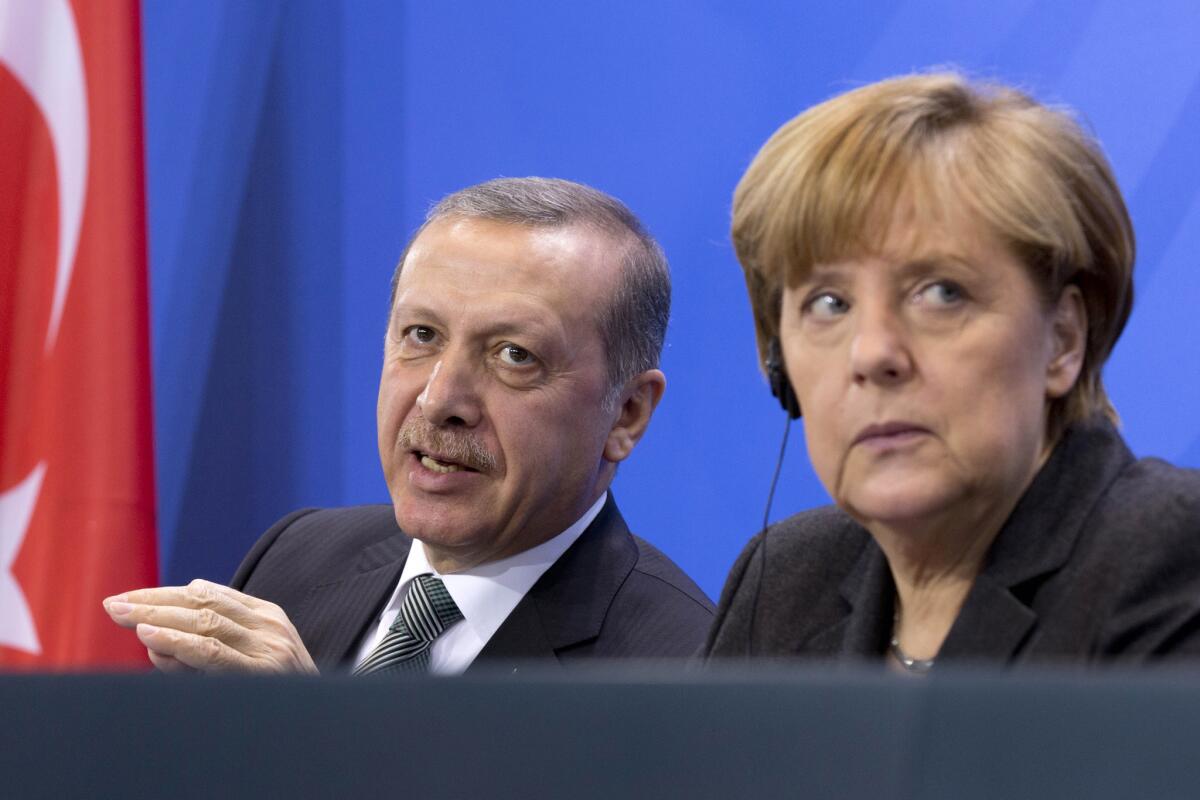Germany chooses to allow possible prosecution of comedian who satirized Turkish president

In this Feb. 4 file picture, German Chancellor Angela Merkel listens to Turkish President Recep Tayyip Erdogan during a joint news conference after a meeting in Berlin.
Reporting from Berlin — Germany’s government cleared a path Friday for the possible prosecution of a popular TV comedian for reading a poem on air satirizing Turkey’s president, despite concerns that legal action would be an attack on free speech.
German Chancellor Angela Merkel said the decision was not a verdict on comedian Jan Boehmermann’s guilt or innocence. She also announced that her government would abolish its obscure law that permits the prosecution of anyone in Germany who criticizes foreign leaders.
The Turkish government requested that criminal proceedings be brought against Jan Boehmermann over the poem, which suggested that President Recep Tayyip Erdogan engaged in sexual acts with goats.
Merkel said the German government had no choice but to allow the possible prosecution under the rarely enforced criminal code written in 1953.
“It’s not up the government, in a state based on the rule of law, but rather up to state prosecutors and courts to weigh press and artistic freedom against basic personal rights,” she said. The decision was “neither a pre-judgment against the person involved nor an intervention for a decision on the boundaries of free speech and a free press but rather it is simply the case … that state prosecutors and courts will have the final word.”
Critics said Merkel, who grew up in Communist East Germany and had long been a champion for free speech and democratic freedoms, had caved in to pressure from Ankara because she needs Turkey’s support for resolving the refugee crisis. Her backers said free speech has limits and doesn’t protect Germans from insulting foreign leaders.
In Turkey, analysts expressed concern that Erdogan would use Germany’s decision to further clamp down on domestic dissent.
See more of our top stories on Facebook >>
Since Erdogan’s ascent to the presidency in August 2014, nearly 2,000 cases have been opened against Turkish citizens for insulting the president. Among those investigated are journalists, politicians, a beauty queen and children.
“Erdogan and the AKP will use Merkel’s decision quite happily; they will be relishing it,” said Cengiz Aktar, a political scientist and senior scholar at the Istanbul Policy Institute, a think tank. “Now they can say, look Germany is a democratic country and they allow prosecution for insulting the presidency. Merkel has given him a golden gift.”
Merkel and other European Union officials are due in Turkey on April 23, to visit refugees in the southeastern city of Gaziantep, near the Syrian frontier. That city and its environs host vast numbers of Syrians, displaced during six years of war.
Germany’s center-left Social Democrats (SPD), who are the junior partners in Merkel’s grand coalition government, were firmly against the decision on the Boehmermann issue, but were overruled, said Foreign Minister Frank-Walter Steinmeier.
“It’s our view that the prosecution shouldn’t have been authorized,” he said.
It wasn’t the first time Boehmermann had tried to get under Erdogan’s skin. On March 22, he sang a song lampooning the Turkish leader as a thin-skinned authoritarian who trounces civil liberties. Turkey’s Foreign Ministry summoned the German ambassador for a meeting over the song, but the envoy maintained that freedom of expression is treasured in Germany, where memories of the country’s Nazi past are never far from the surface.
NEWSLETTER: Get the day’s top headlines from Times Editor Davan Maharaj >>
Boehmermann, whose show was canceled this week, and his family have been under police protection in Cologne, authorities said. Before reading his poem, he acknowledged he was testing the boundaries of satire. In the poem, he also accused Erdogan of “repressing minorities, kicking Kurds and slapping Christians.”
He did not have any comment on Merkel’s decision. Prosecutors have already been exploring whether the comedian broke the law. If convicted, he could face up to three years in prison or even up to five years if the court rules the insults to be slanderous. Legal analysts said that it was more likely he would face a fine if convicted.
Special correspondents Kirschbaum reported from Berlin and Johnson from Ankara, Turkey.
ALSO
Belgian transport minister resigns after airport security criticized
Bernie Sanders interrupts campaign for trip to Vatican but doesn’t meet Pope Francis
Pope’s visit to Greek island of refugees will be rich on symbolism as churches show unity
More to Read
Sign up for Essential California
The most important California stories and recommendations in your inbox every morning.
You may occasionally receive promotional content from the Los Angeles Times.










